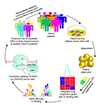Blood Sugar Levels: When It’s a Good Idea for T2Ds to Test Their Glucose
April 5, 2019

New research suggests many people with type 2 diabetes may be overusing self-monitoring blood glucose supplies. Mark Schutta, MD, medical director of the Penn Rodebaugh Diabetes Center, says how often and when people test depends both on a person’s physical condition and how well they are taking care of their disease.
Learn more in the Diabetes OnTrack Article
Professor Mitchell Lazar receives the 2019 Rolf Luft Award
February 13, 2019

Professor Mitchell Lazar at Perelman School of Medicine, University of Pennsylvania, Philadelphia has been selected as recipient of the Rolf Luft Award 2019. The Prize Lecture “Nuclear Receptors, Circadian Rhythms, and Metabolism" will be held by Professor Lazar at the Prize Ceremony, in Nobel Forum, on May 8th, 2019.
Rolf Luft Award is awarded annually by The Karolinska Institutet for outstanding scientific contribution in endocrinology and diabetes.
Illuminating Genetic Variants’ Causal Role in Response to Diabetes Drug
January 24, 2019

A team led by Mitchell Lazar, MD, PhD, director of the Institute for Diabetes, Obesity, and Metabolism, identified a single nucleotide polymorphism that affected whether the diabetes drug Avandia would cause a rise in cholesterol levels. “We went beyond just association, which is easy and most studies do [and] showed a causal relationship,” said Lazar. "We clearly showed that the single difference is responsible, statistically at least, for cholesterol increases.”
Using Genetics of Human Fat Cells to Predict Response to Anti-Diabetes Drugs
January 11, 2019

Drugs called thiazolidinediones (TZDs) reverse insulin resistance in patients with type 2 diabetes by targeting the activity of a receptor protein. However, an array of side effects, including weight gain, edema, and high cholesterol, limits their use in the clinic. In a new study published in Cell Stem Cell, a team of researchers led by Mitchell Lazar, MD, PhD,have demonstrated — using fat cells derived from human stem cells — that individual genetic variation can be used to predict whether the TZD rosiglitazone will produce the unwanted side effect of increasing cholesterol levels in certain individuals.
Read More: Penn Medicine News Release
Experimental Treatment for Type 1 Diabetes Avoids Pancreas Transplant
January 3, 2019

The Philadelphia Inquirer featured research for treating type 1 diabetes with pancreatic islet cell transplantation, which has resulted in some patients no longer needing insulin to manage their disease. Ali Naji, MD, PhD, director of the Pancreatic Islet Cell Transplantation Program, and Michael Rickels, MD, medical director of the program, are quoted.
Diabetes Awareness Month: The Past, Present and Future of Diabetes Treatment
November 16, 2018

In the last 20-plus years, there has been a rapid acceleration of research and technology to make the lives of people with diabetes easier to manage. One promising treatment approach currently being developed is islet cell transplant. Michael Rickels, MD, medical director for the Pancreatic Islet Cell Transplantation Program at the Hospital of the University of Pennsylvania, notes, “this therapy has been life-changing and really transformative” for patients who are debilitated by glycemic lability and frequent, severe hypoglycemia.
The Secret Life of Fat Cells
October 24, 2018

The research of Mitch Lazar, MD, PhD, director of the Institute for Diabetes, Obesity, and Metabolism, is highlighted in a Chemical & Engineering News article discussing the growing body of work establishing that fat cells are much more than a calorie cache.
Read More - Chemical & Engineering News via ACS Central Science
Brown Fat Could Help Fight Obesity – This Penn Scientist Is Looking to Harness Its Power
October 10, 2018

The research of Patrick Seale, PhD, an associate professor of Cell and Developmental Biology, was featured in the Philadelphia Inquirer’s “Five Questions” column. Seale studies brown and white fat and their relationship to metabolic diseases.
Genetic Variants Reveal New Targets for Chronic Kidney Disease Treatment
October 1, 2018

The kidney does more than double or even triple duty compared to other organs - it extracts waste, balances body fluids, forms urine, regulates blood pressure, and secretes hormones. Given this complexity, when things go wrong, havoc can ensue, causing a suite of symptoms called chronic kidney disease (CKD), which includes toxin accumulation, fatigue, and high blood pressure.
Patrick Seale, Ph.D. Receives Award
September 24, 2018
The EndoSociety honored Patrick Seale with the Richard Weitzman Outstanding Early Career Investigator Award for his work on the fundamental biology of brown fat and its role in obesity and type 2 diabetes. The award is presented to an exceptionally promising young clinical or basic investigator who has not reached the age of 50 by December 31 of the year in which the award is presented.
Diabetes Drugs Act as Powerful Curb for Immune Cells in Controlling

July 30, 2018
When tissue is damaged, one of the body’s first inflammatory immune-system responders are macrophages – “construction worker” cells that clear away damaged tissue debris and initiate repair. However, prolonged inflammation promotes the progression of many diseases, including obesity. Now, a common class of drugs used to treat diabetes has been found to exert a powerful check on macrophages. These findings are detailed in a study led by Mitchell Lazar, MD, PhD, director of the Institute for Diabetes, Obesity, and Metabolism in the Perelman School of Medicine at the University of Pennsylvania.
Read More: Penn Medicine News Release
Doris A. Stoffers, MD, PhD elected to the Council of the ASCI.
May 4, 2018

Congratulations to Doris A. Stoffers for her election to the Council for the American Society of Clinical Investigation.
Mitchell A. Lazar, MD, PhD inducted into the National Academy of Sciences.

April 28, 2018
Congratulations is to Dr. Mitchell A. Lazar on his formal induction into The National Academy of Sciences (NAS) at the annual meeting #NAS155. The National Academy of Sciences is a private, nonprofit organization of the country’s leading researchers. The NAS recognizes and promotes outstanding science through election to membership; publication in its journal, PNAS; and its awards, programs, and special activities.
Women Past Menopause May Be Fatter Than They Think
April 19, 2018

Anastassia Amaro, MD, medical director of Penn Metabolic Medicine, and Anne R. Cappola, MD, ScM, a professor of Medicine in Diabetes, Endocrinology and Metabolism, are quoted in a Philadelphia Inquirer story about why body mass index (BMI) may no longer be an accurate measure of obesity for post-menopausal women, following a new study published in the journal Menopause.
Dr. Ali Naji receives the 2018 Thomas E. Starzl Prize in Surgery and Immunology
April 17, 2018

We are very proud to share with everyone that Ali Naji, MD, PhD, was awarded the Thomas E. Starzl Prize in Surgery and Immunology this week in Pittsburgh. This is one of the highest honors for a transplant surgeon-scientist. The Thomas E. Starzl Prize in Surgery and Immunology was established in 1996 by the Department of Surgery to honor the clinical and scientific contributions of Dr. Thomas E. Starzl. Outstanding national and international leaders who have made significant contributions to the fields of organ transplantation and immunology are invited to the University of Pittsburgh to present their work and receive the prize. Ali was there this week to give his lecture and to be honored.
Clock Protein Controls Daily Cycle of Gene Expression by Regulating Chromosome Loops, Finds Penn Study
New understanding of Rev-erb’s role has implications for metabolic disorders, cardiovascular disease, and cancerFebruary 9, 2018

It’s well known that the human body functions on a 24-hour, or circadian, schedule. The up-and-down daily cycles of a long-studied clock protein called Rev-erb coordinates the ebb and flow of gene expression by tightening and loosening loops in chromosomes, according to new research from thePerelman School of Medicine at the University of Pennsylvania. The findings appear online this week in Science First Release.
Over the last 15-plus years, a team led by the new study’s senior author Mitchell A. Lazar, MD, PhD, director of Penn’s Institute for Diabetes, Obesity, and Metabolism, has been teasing out the versatile role of Rev-erb in maintaining daily cycles of the body’s molecular clock, metabolism, and even brain health.
Real-time CGM Improves Hypoglycemic Awareness
November 28, 2017

Adults with long-standing type 1 diabetes may increase awareness of hypoglycemia and reduce severity of hypoglycemic events by using real-time continuous glucose monitoring, but the endogenous glucose counterregulation is only modestly improved, study data show.
“In long-standing type 1 diabetes, patients can develop reduced symptom awareness of hypoglycemia that can contribute to experiencing severe hypoglycemia episodes where assistance from another person is required and can result in seizures and coma,” Michael R. Rickels, MD, MS, associate professor of medicine in the division of endocrinology, diabetes and metabolism at the Perelman School of Medicine at the University of Pennsylvania in Philadelphia, told Endocrine Today. “This study was undertaken to determine if real-time knowledge of glucose levels, available continuously from a CGM, can specifically help the patients who are having the most problematic hypoglycemia to experience less low blood glucose and recover symptom awareness and physiologic defenses against the development of low blood glucose.”
Insulin Signaling Molecule in Liver Controls Levels of Triglyceride in Blood
October 19, 2017

A new animal study shows how insulin controls the movement and storage of fat molecules in the liver and how a breakdown in this system could lead to non-alcoholic fatty liver disease and changes in circulating lipid levels associated with cardiovascular disease. Researchers from the Perelman School of Medicine at the University of Pennsylvania published their findings in the Journal of Clinical Investigation (JCI).
“The production of triglyceride in the liver and its secretion into blood are closely linked to nutrient availability and insulin levels,” said senior author Paul Titchenell, PhD, an assistant professor of Physiology and a member of the Institute for Diabetes, Obesity, and Metabolism. “After a meal, insulin tells the liver to package and secrete excess nutrients into triglyceride-rich lipid particles into the blood for use by the rest of the body.”
Minidose Glucagon for Exercise-Induced Hypoglycemia in T1D
September 18, 2017

Results of a recent Penn study led by Michael Rickels, M.D., M.S. was presented at the European Association for the study of Diabetes (EASD) 2017 Annual Meeting in Lisbon, Portugal. Dr. Rickels presentation of this study was covered by Medscape's editorial staff.
Read more: Medscape article
Dr. Agarwal Advocates for diabetes care in Washington, D.C.
September 14, 2017

Shivani Agarwal, M.D., M.P.H. pictured with Senator Cory Booker went before congress to advocate for diabetes care.
Health Issues Millennials (and Their Parents) Need to Stop Ignoring
July 13, 2017

Shivani Agarwal, MD, MPH, an assistant professor of Medicine in Endocrinology, Diabetes, and Metabolism, is quoted in a Reader’s Digest story discussing some of the health issues millennials should pay more attention to in order to lead long, healthy lives.
Read More Reader’s Digest Article
Molecular Pilot Light Prepares Body’s Heating System For the Cold
June 14, 2017
Penn Animal Study Discovers New Molecular Player in Burning Sugar and Fat to Boost Metabolism
 This week in Nature, a team from the Perelman School of Medicine at the University of Pennsylvania detail a molecule that acts as a molecular pilot light required to turn on the brown fat furnace.
This week in Nature, a team from the Perelman School of Medicine at the University of Pennsylvania detail a molecule that acts as a molecular pilot light required to turn on the brown fat furnace.
Brown fat burns sugar and fat to produce radiant heat in the body. Researchers have turned their attention to these cells because some of the sugar and fat they burn is stored in the body and might otherwise lead to increases in white fat, the form that increases in obesity.
“To harness the fat-burning potential of brown fat we must better understand how the body burns fuel to stay warm and how this relates to the storage of excess fuel as white fat in obesity,” said senior author Mitchell Lazar, MD, PhD, director of the Institute for Diabetes, Obesity, and Metabolism (IDOM) and the Willard and Rhoda Ware Professor in Diabetes and Metabolic Diseases
Read More - Penn Press Release
Translational Center of Excellence in Type 1 Diabetes
March 13, 2017
We are delighted to announce the establishment of a new Translational Center of Excellence in Type 1 Diabetes at the Perelman School of Medicine. The Center will be under the auspices of the Institute for Diabetes, Obesity, and Metabolism (IDOM), and will be directed by Klaus Kaestner, PhD, MS, Thomas and Evelyn Suor Butterworth Professor in Genetics and co-directed by Ali Naji, J, MD, PhD, William White Professor of Surgery.
The Best of JCEM 2016
March 10, 2017

Congratulations to Michael Rickels, MD, MS for being included in The Best of JCEM 2016 collection of the best research articles published in JCEM in the past year.
The collection includes articles focusing on the following topic areas:
- Diabetes
- Metabolism/Obesity
- Adrenal Cortex/Hypertension
- Sexual and Gender-dependent Endocrinology
- Cardiovascular Endocrinology/Lipids
- Growth, Growth Hormone, and Growth Factor
- Endocrine Genetics
- Thyroid
- Bone/Mineral Metabolism
- Hypothalamus/Pituitary
Penn Study Parses Influence of Genes and Environment in Metabolic Disease
March 07, 2017
The a team, led by Raymond Soccio, MD, PhD, an assistant professor of Medicine, and Mitchell Lazar, MD, PhD, director the Institute for Diabetes, Obesity, and Metabolism, published their findings online in the Journal of Clinical Investigation (JCI), in addition to an Author’s Take video.
Studies Show Benefits and Risks of Testosterone Treatment in Older Men
February 22, 2017
Coverage continues around the Testosterone Trials, led by Peter J. Snyder, MD, a professor of Medicine in the division of Endocrinology, Diabetes, and Metabolism, which found that testosterone treatment improved bone density and anemia for men over 65 with unequivocally low testosterone, but did not improve cognitive function, and increased the amount of plaque buildup in participants' coronary arteries. Snyder and co-author Susan Ellenberg, PhD, a professor of biostatistics, are quoted in several outlets.
Learn more - Reuters • NPR • MedPage Today • Medical News Today • News Medical
Major Study Finds Testosterone Therapy is No Fountain of Youth
February 21, 2017
 JAMA and JAMA Internal Medicine published final results from the TTrials, which shows testosterone treatment improved bone density and anemia for men over 65 with low testosterone, did not improve cognitive function, and increased the amount of plaque buildup in coronary arteries. Principal investigator Peter J. Snyder, MD, a professor of Medicine in Endocrinology, Diabetes and Metabolism, and co-author Susan Ellenberg, PhD, a professor of biostatistics, are quoted in NPR, Associated Press, and CNN stories, among others.
JAMA and JAMA Internal Medicine published final results from the TTrials, which shows testosterone treatment improved bone density and anemia for men over 65 with low testosterone, did not improve cognitive function, and increased the amount of plaque buildup in coronary arteries. Principal investigator Peter J. Snyder, MD, a professor of Medicine in Endocrinology, Diabetes and Metabolism, and co-author Susan Ellenberg, PhD, a professor of biostatistics, are quoted in NPR, Associated Press, and CNN stories, among others.
Learn more - Penn Medicine News Release • Philadelphia Inquirer • NPR • Associated Press via Washington Post • CNN
At N. Philly Middle School, Kids Learn to Look out for a Disease that Once Struck Only Grownups
February 6, 2017

The Philadelphia Inquirer featured the work of Mark Schutta, MD, director of the Rodebaugh Diabetes Center, and a team from the Center, who recently led a diabetes education assembly at St. Martin de Porres school in North Philadelphia. Students, along with caregivers and staff, were invited to attend to learn more about the prevalence and risk of type 2 diabetes, and they had the opportunity to receive a blood glucose screening.
Penn Researchers Receive $12 Million from National Institutes of Health to Establish Pancreas Research Program
December 21, 2016

The National Institute of Diabetes and Digestive and Kidney Diseases (NIDDK) has awarded Penn Medicine a $12 Million, four-year grant to establish the Human Pancreas Analysis Program (HPAP).
“The past decades have seen a dramatic improvement in our ability to profile human tissues relevant to Type 1 diabetes at the genomic, epigenomic, protein, and functional levels,” said Klaus H. Kaestner, PhD, the Thomas and Evelyn Suor Butterworth Professor in Genetics and associate director of the Penn Diabetes Research Center, in the Perelman School of Medicine at the University of Pennsylvania.
Molecular “Pillars” Team Up to Protect Liver from Toxic Fat Buildup
November 18, 2016

A new study published online today in Cell Metabolism by a team led by Mitchell Lazar, MD, PhD, director of the Institute for Diabetes, Obesity, and Metabolism in the Perelman School of Medicine, revealed a surprising relationship between two molecules that works to store fat and promote fat burning for energy.
Penn Endocrinologist Featured on The Endocrine Society Centennial Website
November 2, 2016

November was National Diabetes Month, and the Endocrine Society is celebrating this on its centennial website. The video on that page features our own Dr. Shivani Agarwal as well as footage of IDOM researchers in action.
Penn Medicine Geneticist to Receive 2017 Laureate Award from Endocrine Society
September 6, 2016

PHILADELPHIA—Klaus H. Kaestner, PhD, the Suor Butterworth Professor of Genetics and associate director of the Diabetes Research Center and the Center for Molecular Studies in Digestive and Liver Diseases in the Perelman School of Medicine at the University of Pennsylvania, will receive the 2017 Roy O. Greep Award for Outstanding Research from the Washington-based Endocrine Society.
Why Even Normal-weight People Should Be Concerned About Prediabetes
August 8, 2016

The Philadelphia Inquirer interviewed Mark H. Schutta, MD, for a piece on the prevalence of pre-diabetes and what can be done to monitor this group of patients.
The Liver Disease that’s Rising among Teetotalers
April 22, 2016

The Philadelphia Inquirer continues to explore the topic of diabetes with a piece on the connection between diabetes and nonalcoholic fatty liver disease.
April 19, 2016
A Small Step Forward for Extremely Hard-to-control Diabetes

6ABC featured a study led locally by Ali Naji, MD, PhD, a professor of Surgery, and Michael R. Rickels, MD, MS, an associate professor of Medicine, both of the Type 1 Diabetes Unit in the Institute for Diabetes, Obesity and Metabolism, which found that transplanted islets provide better glycemic control, improved hypoglycemia awareness, and durable protection against severe hypoglycemic events in type 1 diabetics who have otherwise experienced significant glucose instability.
Penn Researchers Identify Cause of Insulin Resistance in Type 2 Diabetics
March 7, 2016
A new link between high levels of certain amino acids and type 2 diabetes was found by a team led by IDOM member and senior author, Zoltan Arany, MD, PhD and researchers from the Perelman School of Medicine, using mouse and human muscle and blood samples to evaluate the mechanisms that lead to insulin resistance. The findings of this study appear online in Nature Medicine. This latest discovery by IDOM researchers was supported by the American Heart Association, the US National Institutes of Health, and the Geis Realty Group Emerging Initiatives Fund.
Penn Team Shines a Light on Creating Brown Fat to Fight Diabetes FierceBiotech Research
February 18, 2016
 />FierceBiotech highlighted a study by
/>FierceBiotech highlighted a study by
Joseph Baur, PhD, an assistant professor of Physiology, about how to turn white fat cells into brown fat cells, in a process called “beiging,” to bring down blood sugar levels and fight diabetes.
>> Penn Medicine News Release • FierceBiotechTestosterone Boosts Libido And Mood In Study -- But Beware Of Caveats
February 18, 2016

Results from The Testosterone Trials, led by Peter Snyder, MD, a professor in the division of Endocrinology, Diabetes and Metabolism, and a team of researchers, found that testosterone treatment improves sexual activity, walking ability and mood in men over 65 with low T levels. Findings were published in the New England Journal of Medicine and were covered nationally.
Penn Medicine News Release • Wall Street Journal • New York Times • Forbes • CNBC • STAT • Washington Post • Reuters • Philadelphia Inquirer • NBC News • NPR • Chicago Tribune • Huffington Post • MedscapePenn Researchers Offer New Approach to Treating Cocaine Addiction
February 2, 2016

University of Pennsylvania researchers Heath Schmidt, Matthew Hayes and Bart De Jonghe have shown that a drug used for diabetes and obesity may also reduce cocaine dependence.




